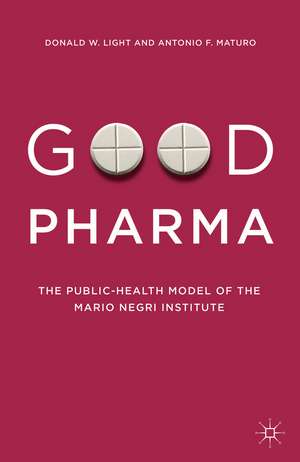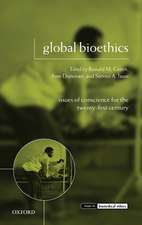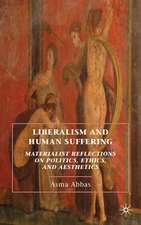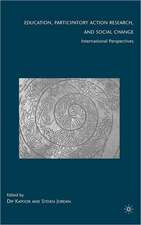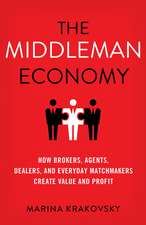Good Pharma: The Public-Health Model of the Mario Negri Institute
Autor Donald W. Light, Antonio F. Maturoen Limba Engleză Hardback – iul 2015
| Toate formatele și edițiile | Preț | Express |
|---|---|---|
| Paperback (1) | 388.34 lei 6-8 săpt. | |
| Palgrave Macmillan US – 10 iun 2017 | 388.34 lei 6-8 săpt. | |
| Hardback (1) | 394.51 lei 6-8 săpt. | |
| Palgrave Macmillan US – iul 2015 | 394.51 lei 6-8 săpt. |
Preț: 394.51 lei
Nou
Puncte Express: 592
Preț estimativ în valută:
75.49€ • 79.03$ • 62.46£
75.49€ • 79.03$ • 62.46£
Carte tipărită la comandă
Livrare economică 07-21 aprilie
Preluare comenzi: 021 569.72.76
Specificații
ISBN-13: 9781137388339
ISBN-10: 1137388331
Pagini: 280
Ilustrații: XVIII, 282 p.
Dimensiuni: 155 x 235 x 23 mm
Greutate: 0.57 kg
Ediția:2015
Editura: Palgrave Macmillan US
Colecția Palgrave Macmillan
Locul publicării:New York, United States
ISBN-10: 1137388331
Pagini: 280
Ilustrații: XVIII, 282 p.
Dimensiuni: 155 x 235 x 23 mm
Greutate: 0.57 kg
Ediția:2015
Editura: Palgrave Macmillan US
Colecția Palgrave Macmillan
Locul publicării:New York, United States
Cuprins
1. List of Illustrations 2. Foreword 3. Preface and Acknowledgements 4. List of Abbreviations 5. Introduction: Beneficence through Principled Research for Patients PART I: DEVELOPING A RESEARCH INSTITUTE FOR SOCIETY 6. Origins and American Inspirations 7. The Formative Years Leadership, Culture & Organization 8. Expansions to New Campuses and Integrated Research 9. Educating the Public and Future Researchers PART II: RECONCEIVING THE AIMS OF PHARMACOLOGICAL RESEARCH 10. From Measuring Environmental Toxins to Drugs as Contaminants 11. Pioneering Ethical Trials for Integrated Research PART III: PROMOTING GOOD SCIENCE FOR BETTER MEDICINES 12. Science-based Initiatives Against Dangerous or Useless Drugs 13. Global Campaigns Against Harmful Regulations and Practices 14. Good Science for Good Pharma A Global Model 15. Appendices
Recenzii
“Good pharma is a fascinating story and a must read for all those who believe that something is not right about the way we incentivise medical research today. Both laypersons and specialists in the field will find something to think about in a book that is full of delectable nuggets of information interspersed in the story of Silvio Garattini and the Mario Negri Institute.” (Amit Sengupta, Indian Journal of Medical Ethics, August, 2016)
“By offering a sociological perspective on the drug development process, this book presents an alternative perspective to mainstream pharmaceutical drug production focused on patenting and profit while ignoring public-health needs. … The book shows how personal life events and experiences collided to lead to the founding of the institute. … a welcome addition to the sociology of health and medicine and would likely appeal to those interested in critical perspectives of pharmaceuticals, health and the regulation of clinical trials.” (Shadreck Mwale, Sociology of Health & Illness, June, 2016)
“The authors document what they see as the generalizable best practices of this pharmacological research institution, which is based in Milan and has centers in two other Italian cities. … Some readers may already be familiar with the litany of complaints about the pharmaceutical industry, as well as the proposed best practices chronicled in Good Pharma. Even for them, the book may be worth reading.” (Jennifer E. Miller, Health Affairs, Vol. 34 (12), 2015)
“Good Pharma tells the story from 1961 to present of the origins and development of the Instituto di Ricerche Farmacologiche Mario Negri, named after its endower, a Milanese jeweller-philanthropist. … Good Pharma is worth reading and digesting as it documents how the Negri model has produced some outstanding successes, such as the GISSI trials, and makes a strong case for viewing pharmacological research as a long-term risky investment.” (Drug and Therapeutics Bulletin of Navarre, Vol. 23 (2), 2015)
“By offering a sociological perspective on the drug development process, this book presents an alternative perspective to mainstream pharmaceutical drug production focused on patenting and profit while ignoring public-health needs. … The book shows how personal life events and experiences collided to lead to the founding of the institute. … a welcome addition to the sociology of health and medicine and would likely appeal to those interested in critical perspectives of pharmaceuticals, health and the regulation of clinical trials.” (Shadreck Mwale, Sociology of Health & Illness, June, 2016)
“The authors document what they see as the generalizable best practices of this pharmacological research institution, which is based in Milan and has centers in two other Italian cities. … Some readers may already be familiar with the litany of complaints about the pharmaceutical industry, as well as the proposed best practices chronicled in Good Pharma. Even for them, the book may be worth reading.” (Jennifer E. Miller, Health Affairs, Vol. 34 (12), 2015)
“Good Pharma tells the story from 1961 to present of the origins and development of the Instituto di Ricerche Farmacologiche Mario Negri, named after its endower, a Milanese jeweller-philanthropist. … Good Pharma is worth reading and digesting as it documents how the Negri model has produced some outstanding successes, such as the GISSI trials, and makes a strong case for viewing pharmacological research as a long-term risky investment.” (Drug and Therapeutics Bulletin of Navarre, Vol. 23 (2), 2015)
Notă biografică
Donald W. Light is Professor of Comparative Health Policy at Rowan University, USA and has published widely in major medical and sociological journals on ethical as well as sociological issues. Recently, he served as the Lokey Visiting Professor at Stanford University, USA and as a Visiting Fellow at Harvard University, USA.
Antonio Maturo is Associate Professor of Sociology of Health at Bologna University, Italy and Visiting Professor at Brown University, USA. He has published several books in Italian and he has edited The Medicalization of Life (2009, with P. Conrad) and The Medicine of Emotions and Cognitions (2012, with K. Barker).
Antonio Maturo is Associate Professor of Sociology of Health at Bologna University, Italy and Visiting Professor at Brown University, USA. He has published several books in Italian and he has edited The Medicalization of Life (2009, with P. Conrad) and The Medicine of Emotions and Cognitions (2012, with K. Barker).
Textul de pe ultima copertă
Drawing on key concepts in sociology and management, this history describes a remarkable institute that has elevated medical research and worked out solutions to the troubling practices of commercial pharmaceutical research. Good Pharma is the answer to Goldacre's Bad Pharma: ethical research without commercial distortions.
Caracteristici
Explores the public health model of the Mario Negri Institute Offers a sociological perspective on the drug development process Proposes a new standard for pharmaceutical companies
